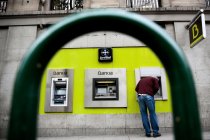bankia Spain
 Photo
Photo
A Bankia location in Madrid. The collapse of the bank a year after its initial public offering prompted Spain’s banking bailout.
Credit
Andrea Comas/Reuters
MADRID — Spain’s national court on Monday ordered a criminal inquiry into whether a former governor of the country’s central bank and seven other regulatory officials knowingly ignored financial problems at Bankia, the giant savings bank whose near collapse prompted Spain’s banking bailout in 2012.
The court said in a statement that there was sufficient evidence to indict the officials in connection with Bankia’s initial public offering in 2011, a year before the bank’s forced nationalization.
Top officials gave the listing regulatory clearance, the court said, “despite having full and thorough knowledge of the situation in which the entity found itself.” The court did not specify any possible charges but cited internal emails in which inspectors warned of the risks linked to Bankia’s finances. The warnings went unheeded by the inspectors’ superiors.
After the court’s announcement, the Bank of Spain, the central bank, said three of the eight officials in question would resign, all of them senior officials in charge of the bank’s supervision and inspection activities.
PhotoRodrigo Rato, formerly chairman of Bankia and head of the International Monetary Fund, has been accused of failing to accurately disclose the bank’s financial health before the public offering.
Credit
Denis Doyle/Getty Images
 The case could be the first instance in which the apex of Spain’s financial regulatory system is held directly accountable for its failure to prevent the Bankia scandal, in particular the initial public offering, in which shareholders were wiped out.
The case could be the first instance in which the apex of Spain’s financial regulatory system is held directly accountable for its failure to prevent the Bankia scandal, in particular the initial public offering, in which shareholders were wiped out.
The Spanish government seized control of Bankia in May 2012 and was then forced to negotiate a European banking bailout a month later when it became clear that the country could not afford the cost of rescuing Bankia and other smaller savings banks, or cajas. Bankia’s bailout required just over 22 billion euros after the bank posted the largest loss in Spanish corporate history in 2012.
While Bankia and smaller banks collapsed as a result of mortgage loan defaults tied to the bursting of Spain’s construction bubble in 2008, their demise also highlighted inefficiencies and conflicts of interest in a sector where politicians often sat on caja boards.
Bankia is already the subject of several court cases, including a trial over whether the former management, led by Rodrigo Rato, failed to accurately disclose the status of Bankia’s accounts before the public offering. Before becoming chairman of Bankia, Mr. Rato was Spain’s finance minister and also served as managing director of the International Monetary Fund.
Source: www.nytimes.com
Related posts:








